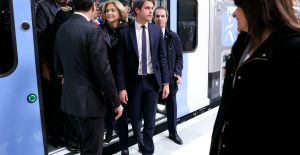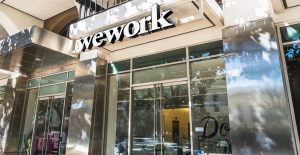Every day 900,000 vehicles enter and leave Barcelona. Reducing this figure has become a priority for the government team headed by the mayor, Ada Colau. Its objective is that, in two years, 82% of trips are made on foot, by bicycle or by public transport and that the share of private vehicles falls below 20%. In this way, the city seeks to comply with the air quality standards established by the EU, and also avoid "a thousand premature deaths per year", in the words of the mayor.
There are different initiatives underway, such as the superblocks (pedestrianization) in the Eixample, the hourly limits on the circulation of polluting vehicles -the Low Emissions Zone (ZBE)-, the expansion of regulated parking spaces and the implementation of Barcelona Endolla, a public system for charging electric vehicles, which already has 12,900 registered users.
Added to all this is the reform of emblematic avenues such as Via Laietana, Las Ramblas, and the central section of Diagonal, through which the connection of the two existing tram networks will run from 2028. Meanwhile, the public operator Transports Metropolitans de Barcelona (TMB) is building a plant that will supply green hydrogen to its buses and is renewing its fleet to reduce emissions.
The employers' association of the large Catalan company, Fomento del Trabajo, has become the main voice against Colau's mobility policies. "Criminalizing the private vehicle is a mistake" since "in the near future, it will be connected, intelligent and environmentally sustainable," says Salvador Guillermo, deputy secretary general. In his opinion, the City Council has its priorities wrong and its bets should be to demand an improvement of Cercanías, "promote an intense renewal of the vehicle fleet" so that the most polluting ones stop circulating, and encourage electrification.
From Terminus, a study center specialized in public transport, Joan Carles Salmerón regrets that the City Council focuses on "small-scale actions" and not on "the improvement of large mass transport systems such as the bus, the tram and the train". "In railways, there are pending challenges for years, such as the improvement of medium-distance lines and international services", he explains.
In commerce, which generates 22% of employment and 15% of local GDP, there is also concern. “We are aware of the environmental context, but there has been a lack of consensus and the impact of these plans on businesses that first suffered from Covid-19 and now, the rise in prices, has not been taken into account,” says Salva Vendrell, president of the federation. of commercial hubs Barcelona Comerç.
Barcelona Global, which brings together 130 companies in the city, has just presented a report where it appreciates several deficits in the municipal strategy. Among them, the blocking of shared electric scooters, the lack of dissuasive parking and the absence of interoperability between the city's public bicycle rental system -Bicing- and the one that TMB will promote in the Metropolitan Area.

 What is chloropicrin, the chemical agent that Washington accuses Moscow of using in Ukraine?
What is chloropicrin, the chemical agent that Washington accuses Moscow of using in Ukraine? Poland, big winner of European enlargement
Poland, big winner of European enlargement In Israel, step-by-step negotiations for a ceasefire in the Gaza Strip
In Israel, step-by-step negotiations for a ceasefire in the Gaza Strip BBVA ADRs fall almost 2% on Wall Street
BBVA ADRs fall almost 2% on Wall Street Children born thanks to PMA do not have more cancers than others
Children born thanks to PMA do not have more cancers than others Breast cancer: less than one in two French women follow screening recommendations
Breast cancer: less than one in two French women follow screening recommendations “Dazzling” symptoms, 5,000 deaths per year, non-existent vaccine... What is Lassa fever, a case of which has been identified in Île-de-France?
“Dazzling” symptoms, 5,000 deaths per year, non-existent vaccine... What is Lassa fever, a case of which has been identified in Île-de-France? Sánchez cancels his agenda and considers resigning: "I need to stop and reflect"
Sánchez cancels his agenda and considers resigning: "I need to stop and reflect" “Amazon product tester”: the gendarmerie warns of this new kind of scam
“Amazon product tester”: the gendarmerie warns of this new kind of scam “Unjustified allegations”, “promotion of illicit products”… Half of the influencers controlled in 2023 caught by fraud repression
“Unjustified allegations”, “promotion of illicit products”… Half of the influencers controlled in 2023 caught by fraud repression Extension of the RER E: Gabriel Attal welcomes a “popular” ecology project
Extension of the RER E: Gabriel Attal welcomes a “popular” ecology project WeWork will close 8 of its 20 shared offices in France
WeWork will close 8 of its 20 shared offices in France “We were robbed of this dignity”: Paul Auster’s wife denounces the betrayal of a family friend
“We were robbed of this dignity”: Paul Auster’s wife denounces the betrayal of a family friend A masterclass for parents to fill in their gaps before Taylor Swift concerts
A masterclass for parents to fill in their gaps before Taylor Swift concerts Jean Reno publishes his first novel Emma on May 16
Jean Reno publishes his first novel Emma on May 16 Cannes Film Festival: Meryl Streep awarded an honorary Palme d’Or
Cannes Film Festival: Meryl Streep awarded an honorary Palme d’Or Omoda 7, another Chinese car that could be manufactured in Spain
Omoda 7, another Chinese car that could be manufactured in Spain BYD chooses CA Auto Bank as financial partner in Spain
BYD chooses CA Auto Bank as financial partner in Spain Tesla and Baidu sign key agreement to boost development of autonomous driving
Tesla and Baidu sign key agreement to boost development of autonomous driving Skoda Kodiaq 2024: a 'beast' plug-in hybrid SUV
Skoda Kodiaq 2024: a 'beast' plug-in hybrid SUV The home mortgage firm rises 3.8% in February and the average interest moderates to 3.33%
The home mortgage firm rises 3.8% in February and the average interest moderates to 3.33% This is how housing prices have changed in Spain in the last decade
This is how housing prices have changed in Spain in the last decade The home mortgage firm drops 10% in January and interest soars to 3.46%
The home mortgage firm drops 10% in January and interest soars to 3.46% The jewel of the Rocío de Nagüeles urbanization: a dream villa in Marbella
The jewel of the Rocío de Nagüeles urbanization: a dream villa in Marbella Europeans: a senior official on the National Rally list
Europeans: a senior official on the National Rally list Blockade of Sciences Po: the right denounces a “drift”, the government charges the rebels
Blockade of Sciences Po: the right denounces a “drift”, the government charges the rebels Even on a mission for NATO, the Charles-de-Gaulle remains under French control, Lecornu responds to Mélenchon
Even on a mission for NATO, the Charles-de-Gaulle remains under French control, Lecornu responds to Mélenchon “Deadly Europe”, “economic decline”, immigration… What to remember from Emmanuel Macron’s speech at the Sorbonne
“Deadly Europe”, “economic decline”, immigration… What to remember from Emmanuel Macron’s speech at the Sorbonne These French cities that will boycott the World Cup in Qatar
These French cities that will boycott the World Cup in Qatar Champions Cup: Toulouse with Flament and Kinghorn against Harlequins, Ramos replacing
Champions Cup: Toulouse with Flament and Kinghorn against Harlequins, Ramos replacing Tennis: still injured in the arm, Alcaraz withdraws from the Masters 1000 in Rome
Tennis: still injured in the arm, Alcaraz withdraws from the Masters 1000 in Rome Sailing: “Like a house that threatens to collapse”, Clarisse Crémer exhausted and in tears aboard her damaged boat
Sailing: “Like a house that threatens to collapse”, Clarisse Crémer exhausted and in tears aboard her damaged boat NBA: Patrick Beverley loses his temper and throws balls at Pacers fans
NBA: Patrick Beverley loses his temper and throws balls at Pacers fans


















